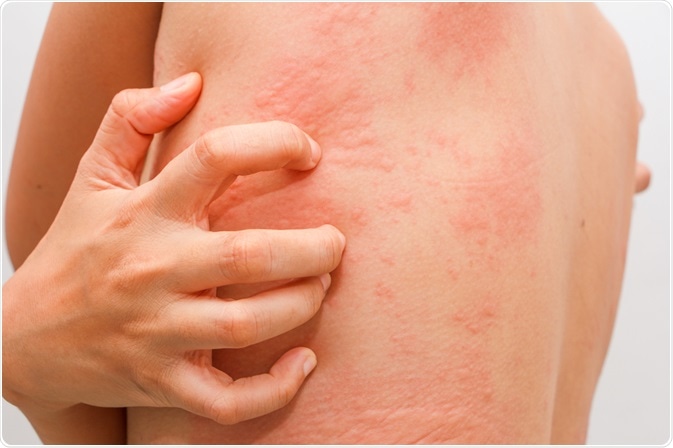Hives, also known as urticaria, are slightly raised, itchy rashes on the skin that may eventually convert into inflamed welts.
The condition is very common, affecting about 20% of the general population at some point in their life.

Image Credit: namtipStudio/Shutterstock.com
What are hives?
A hive is a type of skin rash that can result from drug or food allergies. An allergic skin reaction can be triggered by many substances or conditions, including medicines (pain killers or antibiotics), foods (egg, shellfish, and peanut), illicit drugs or alcohol, bacterial or viral infections, blood transfusion, insect bites, pollens, pet dander, emotional distress, hot or cold climate, sunlight, scratching, or exercise.
Upon exposure to these triggers, certain cells in the body start releasing chemicals, such as histamine, into the blood, which is the main cause of allergic skin reactions. The size of itchy patches/welts often vary in size, and they can appear on any skin part.
Sometimes, small welts may merge to form very large single welts. In some cases, large welts may appear deeper under the skin, which is medically known as angioedema. This condition needs immediate medical attention.
Acute hives can last up to 6 weeks. Allergies to some medications that have long half-lives can result in hives that last many months until the drug is completely cleared from the body. If hives are recurrent and last for more than 6 weeks, they are called chronic hives.
People with chronic hives often feel uncomfortable and suffer from sleep disturbance. A chronic hive can also interfere with daily life activities.
What are the symptoms of hives?
The most common symptom of hives is red or skin-colored itchy bumps on the skin. Such rashes can appear on any part of the skin and may fade quickly or persist. They may also come back again after a short while. Another typical feature of hives is blanching, which means a red bump can turn white when pressed on the center.
In the case of chronic hives, batches of welts can appear anywhere on the skin, and itching can be severe. Moreover, painful angioedema can be developed on the lips, eyelids, or inside the throat.
There is a tendency of symptom flare-up upon exposure to heat, exercise, or stress.
In some rare cases, hives can be associated with heavy swelling inside the airways, causing difficulty breathing. This can be dangerous, and immediate medical attention is required to treat the condition.
How to diagnose hives?
A single bout of hives is mostly harmless and does not require any medical attention. If hives are chronic or staying for a longer time, one should visit a physician. Initially, a doctor takes a complete medical history of the affected person, including the details of prescribed medicines.
A doctor also asks the patient about details of food intake; about substances, he/she was exposed to at work or home; and about any exposure to pets.
To identify the exact causative factor and confirm the diagnosis, a doctor can ask for skin tests, blood tests, urine tests, or skin biopsy.
How to treat hives?
A mild to moderate hive is generally treated with antihistamine drugs, which help reduce the itchiness. If antihistamines fail to reduce symptoms, a doctor may prescribe other medicines, including histamine blockers, corticosteroids, anti-inflammatory drugs, monoclonal antibodies, or immune-suppressing drugs.
In case of severe symptoms such as breathing difficulties, an epinephrine shot may be required to provide faster management.
Some lifestyle and home remedies are also helpful in managing hives. For example, an episode of hives can be prevented by wearing loose and light cloths and avoiding exposure to common triggers.
Also, one should avoid scratching the affected area or applying harsh soap on it. Applying sunscreen lotion or anti-itch cream together with cold compresses can also be effective.
Most importantly, maintaining a complete record of suspected hive episodes along with corresponding activities is very helpful in detecting the exact causative factor.
Sources
Updated 20th March 2020.
Further Reading
Last Updated: Mar 20, 2020